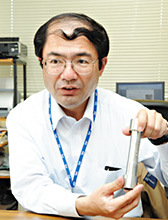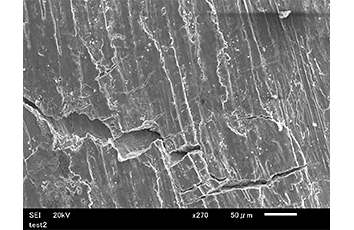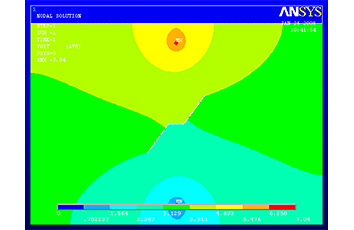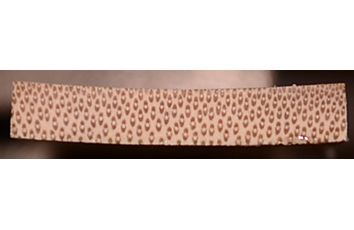
磯貝毅研究室



本研究室は、教育面においては1年次の機械材料学1、工業力学、2・3年次の材料力学1~3をはじめとして、3年次の機械工学実験1・2、機械工作実習、材料強度学などを担当しています。さらに大学院においては、ナノ・巨視融合材料強度学も担当しています。
機器の運転/使用中の事故の原因にはさまざまなものがありますが、この様な事故を防ぎ、安心して使用できる安全な機器や構造物を設計・製造するためには、材料の強度や破壊についての知識や考え方を身につけておく事が大変重要です。
本研究室では、卒業研究として材料強度に関する実験・解析を行うことで、機械技術者として必要不可欠な強度と破壊に関する問題へのアプローチを学んでいきます。
| 教員名・所属 | 磯貝毅 / 総合理工学科機械・航空宇宙コース |
|---|---|
| 専門分野 | 材料力学、材料強度学 |
| 研究テーマ | 機器・構造物の安全性確保のために必要な、材料の強度と破壊に関する研究 |
| 研究キーワード | 疲労、クリープ、多軸応力、き裂成長、寿命予測、バイオミメティクス、破壊形態、転位群の動力学 |
| 教員紹介URL | https://www3.med.teikyo-u.ac.jp/profile/ja.9e4c3ba571d36e6e.html |

組合せ応力における耐熱材料の耐疲労信頼性に関する研究
ジェットエンジン等の高温機器で、運転中に 曲げ+ねじり 等の組合せ応力が加わる部材が存在します。このテーマでは、引張とせん断が同時に負荷された条件で高温での疲労試験を行い、機器の設計に必要となる「どの位の期間使用できるか?」(寿命)の予測法について検討します。また、同様の条件における有限要素法によるコンピュータ解析を行い、組合せ応力の場合について、繰返し負荷によって部材等が破壊する「疲労」破壊の仕組み(メカニズム)について考察していきます。

電気的き裂長さ計測法に関する研究
高温機器において、運転中に部材に欠陥やき裂が発生・成長することは保守管理上大きな問題です。この問題に関する基礎データを収集する目的で行われる高温下での、き裂成長試験においては、試験中に試験材料を直接観察・測定することは極めて困難です。そこで材料内部のき裂や欠陥が大きくなるとその部材の電気抵抗が大きくなる性質を利用してき裂長さを計測する方法(電気ポテンシャル法)が用いられています。本研究では多軸・組合せ応力条件での試験に適用可能な電気的き裂長さ測定法を構築する事を目的として、実験および解析による検討を行います。

バイオミメティクスの材料強度への応用に関する研究
近年、自然界の動植物の持っている優れた性質を工学などへ応用する「バイオミメティクス」という分野が注目されています。この分野の応用例としては、新幹線車両の先頭車をカワセミのくちばしに模した形状にすることにより、トンネル進入時の空気の抵抗を減らし騒音を低減させたこと等があげられます。本研究ではバイオミメティクスの材料強度への応用について検討する目的で、身近な自然材料である竹材の強度特性について実験的に検討します。竹は力学的には弾力に富み強靭であることがあることが知られていることから、その強度発現機構を解明することで新たな材料開発への適用が期待されます。
| 題名 | 研究室 | 内容 |
|---|---|---|
| 高温多軸疲労き裂成長に対する電気ポテンシャル法 | 磯貝毅研究室 | 詳細 |